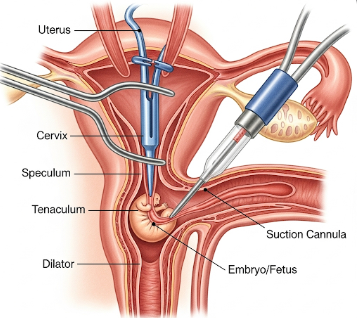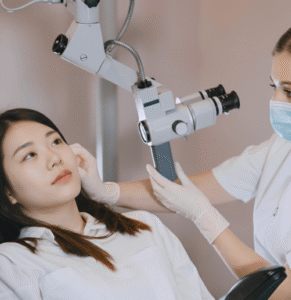Overview
Abortion is a medical procedure that ends a pregnancy. It can be performed surgically or medically (using medications), depending on gestational age and health conditions. Abortion is a common reproductive healthcare service that allows individuals to make informed choices regarding their pregnancy.
In Korea, abortions are performed in licensed hospitals and clinics by trained obstetricians and gynecologists. Procedures are carried out under strict medical standards using safe, modern techniques. Patients receive counseling, post-procedure care, and follow-up to ensure physical and emotional well-being.
What is Abortion?
Abortion involves terminating a pregnancy before the fetus can survive outside the womb. There are two main types:
- Medical Abortion:
- Involves medications such as mifepristone and misoprostol
- Typically performed within the first 7–10 weeks of pregnancy
- Causes the body to expel pregnancy tissue naturally
- Surgical Abortion:
- Involves procedures such as vacuum aspiration, dilation and curettage (D&C), or dilation and evacuation (D&E)
- Can be performed later in pregnancy, depending on gestational age and medical indications
- Performed under local or general anesthesia
Key points:
- Legal and safe when performed in licensed medical facilities
- Choice depends on gestational age, health, and personal preference
- Requires professional counseling and follow-up care
What are the benefits?
- Safe termination of unwanted or high-risk pregnancies
- Reduces complications associated with unsafe abortions
- Respects patient autonomy and choice
- ✅ Can be performed early, minimizing physical and emotional risks
- ✅ In Korea, procedures are regulated, safe, and confidential
- ✅ Allows family planning and reproductive health management
Procedure Details
1) How should I prepare for an Abortion?
- ➤ Consult a licensed healthcare provider for pregnancy confirmation and assessment
- ➤ Discuss medical history, medications, and allergies
- ➤ Arrange for transportation if sedation or anesthesia is involved
- ➤ Pre-procedure counseling about procedure, risks, emotional support, and contraception options
- ➤ Follow fasting instructions if surgical abortion under general anesthesia is planned
2) What happens during the procedure Abortion?
Medical Abortion:
- ✅ Take prescribed medications as directed by the physician
- ✅ May involve one or two doses over several hours or days
- ✅ Cramping and bleeding occur as the body expels pregnancy tissue
- ✅ Usually monitored with follow-up tests or ultrasound to confirm completion
Surgical Abortion:
- ✅ Performed under local or general anesthesia
- ✅ Cervix is dilated carefully, and pregnancy tissue is removed using vacuum aspiration or surgical instruments
- ✅ Duration typically 10–30 minutes, depending on gestational age
- ✅ Patient monitored post-procedure for vital signs, bleeding, and recovery
3) What happens after an Abortion?
- ➤ Rest and avoid strenuous activities for a few days
- ➤ Pain management and antibiotics if prescribed
- ➤ Bleeding and cramping are common for several days
- ➤ Follow-up visit to ensure complete abortion and assess recovery
- ➤ Counseling on contraception and emotional support
Risks / Benefits
Potential Risks:
- ➤ Heavy bleeding
- ➤ Infection
- ➤ Incomplete abortion requiring further treatment
- ➤ Rare complications: damage to uterus or nearby organs
- ➤ Emotional or psychological distress
Benefits:
- ✅ Safe and regulated when performed by licensed providers
- ✅ Minimally invasive options available
- ✅ Allows control over reproductive choices
- ✅ Reduces health risks associated with unsafe abortion practices
- ✅ In Korea, procedures are monitored with high safety standards
Recovery and Outlook
- Hospital stay: Usually outpatient for medical or early surgical abortion; overnight may be needed for later-term procedures
- Activity: Light activity recommended; avoid heavy lifting for a few days
- Bleeding: Typically lasts a few days to two weeks; monitor for excessive bleeding
- Follow-up: Confirm completion with ultrasound or physical examination
- Emotional care: Support from healthcare providers, counseling, and trusted individuals is important
- Long-term outlook: Fertility usually returns quickly after abortion, and future pregnancies are possible
When To Call the Doctor
- ➤ Excessive bleeding soaking more than two pads per hour
- ➤ Severe abdominal pain not relieved by medication
- ➤ Fever or signs of infection
- ➤ Foul-smelling discharge
- ➤ Emotional distress requiring professional support
Best Korea Option / Process
- ✅ Korea provides licensed hospitals and clinics specializing in safe abortion procedures
- ✅ Procedures follow strict medical protocols and confidentiality standards
- ✅ Comprehensive care includes pre-procedure counseling, skilled surgical or medical management, and post-procedure follow-up
- ✅ International patients benefit from VIP services, English-speaking staff, and coordinated care
- ✅ Modern techniques and expert providers ensure minimal complications and high patient safety













